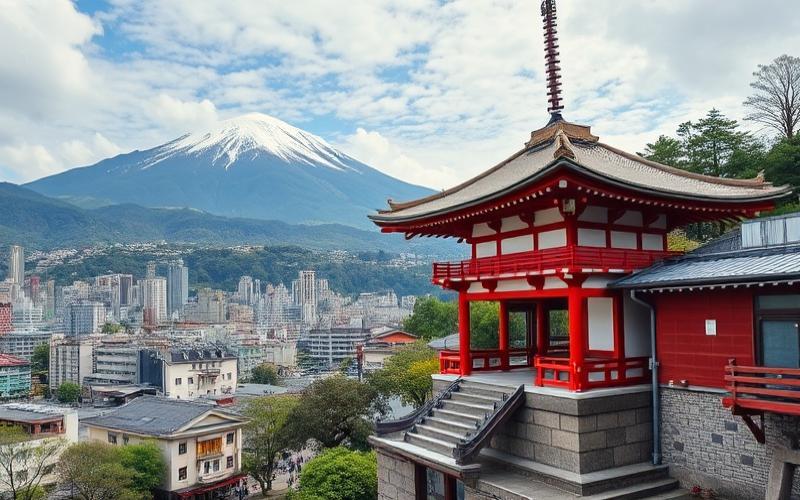
 Published on and written by Cyril Jarnias
Published on and written by Cyril Jarnias
In a global context marked by constantly evolving real estate markets, Japan stands out with a unique set of rules and standards governing investments in this key sector. Understanding Japanese regulations is crucial for anyone wishing to navigate this complex landscape, as they influence both opportunities and potential challenges for investors. These laws cover various aspects, from tenant protection to taxation, and play an essential role in maintaining a balance between national interest and the ambitions of foreign investors. This article explores the legislative nuances shaping Japanese real estate investment, offering an indispensable overview for those looking to leverage this fascinating market.
Clarifying Rules for Foreign Investors in Japanese Real Estate
Regulations and Procedures Regarding Real Estate Acquisition
When a foreign investor wishes to acquire real estate in Japan, they fundamentally enjoy the same rights as Japanese citizens, but several important regulations and procedures exist.
Ownership Restrictions
In Japan, there are no fundamental restrictions regarding real estate ownership by foreigners. Foreign investors can acquire land and building ownership rights in the same manner as Japanese citizens. There is no imposed time limit on ownership rights, allowing for free sale, gifting, or inheritance of properties.
However, with the enactment of the Important Land Survey Law in 2021, restrictions were imposed on land acquisition in certain strategic areas. Affected areas include those around important facilities such as:
- Self-Defense Forces bases
- US military bases
- Nuclear power plants
- Remote islands near borders
Administrative Procedures
Foreign investors wishing to acquire real estate in Japan must follow these administrative procedures:
- Preparation of a sworn statement: foreigners residing overseas or without medium or long-term residence visas must prepare a sworn statement in place of a residence certificate or seal registration certificate.
- Preparation of identification documents: a passport or other identity document is required.
- Designation of a tax manager: foreigners residing overseas must designate a tax manager domiciled in Japan.
- Report under the Foreign Exchange and Foreign Trade Act: for significant land purchases or in certain critical regional areas, a report to the government under the Foreign Exchange and Foreign Trade Act is required.
Tax Responsibilities
The tax responsibilities of foreign investors are essentially the same as those of Japanese citizens. Main taxes include:
- Real estate acquisition tax: imposed when purchasing real estate
- Property tax: imposed annually on property ownership
- Income tax and capital gains tax: imposed on income from property rental or sale
Declaration and payment of these taxes must be completed within prescribed deadlines. For foreigners residing overseas, procedures are handled through the tax manager.
Agricultural Land Regulations
There are no specific restrictions for foreign investors regarding agricultural land acquisition, but general regulations under the Agricultural Land Act apply. Acquiring agricultural land requires permission from the agricultural committee and the intention to actually cultivate the land is required.
Impact of Recent Legislative Revisions
The Important Land Survey Law, which took effect in September 2022, established restrictions on land acquisition in areas crucial for national security. This law allows the government to investigate land use in these regions and take corrective measures if necessary.
Furthermore, since 2023, several bills aimed at strengthening regulation of land acquisition by foreigners have been introduced, but none have been enacted. These movements reflect increased security awareness.
Challenges and Opportunities for International Investors: Case Studies
Success example: foreign investment in the Niseko region
The Niseko region in Hokkaido has seen successful resort development by foreign investors, particularly Australians. They leveraged Japan’s freedom of real estate acquisition to develop a world-renowned ski resort. This example shows that the Japanese real estate market offers attractive opportunities for foreign investors.
Challenge example: water source purchase issues
Conversely, mass purchases of water sources by foreign capital have been criticized. In these cases, concerns have been raised regarding national security and resource management, leading to local regulations being adopted by municipalities. In response, the government is moving toward strengthening regulations on land acquisition in important areas.
These examples illustrate that although the Japanese real estate market is open to foreign investors, certain regulations are necessary from the perspective of national security and resource management. It is crucial for international investors to thoroughly understand these Japanese particularities and proceed with investments while obtaining appropriate legal advice.
Good to Know:
Foreign investors in Japan must navigate various regulations, including consultation requirements in certain areas near military or strategic grounds where purchase restrictions may apply. They must obtain authorization from the Bank of Japan for transactions exceeding 100 million yen and comply with the Agricultural Land Acquisition Law, which imposes limitations in this sector. Regarding taxation, foreign investors are subject to the same taxes as residents, including property income tax, and must prepare for the complexity of local administrative processes, often detailed in Japanese. For example, successful acquisition of commercial buildings in Tokyo by foreign funds demonstrates flourishing potential, while attempts to purchase islands for hotel projects have failed due to restrictive national protection laws. Recent legislative adjustments aimed at increasing transparency and accountability in land acquisition may influence investor strategy.
Real Estate Investment in Japan: Understanding Foreign Ownership Regulations
Laws and Regulations Regarding Real Estate Purchases
In Japan, there are no specific restrictions based on nationality or residency status when foreigners purchase real estate. Ownership of land and buildings is recognized without time limitations, and it’s possible to buy, gift, and inherit under the same conditions as Japanese citizens. Furthermore, real estate acquisition does not lead to obtaining a visa or permanent residency permit.
However, in areas important for national security (such as around Self-Defense Forces bases or near borders), the Important Land Survey Law allows investigation of ownership purpose and information, and corrective measures if problems are identified. This law took effect in 2021.
Historical Background and Discussions on Current Regulations
In Japan, property rights are guaranteed by Article 29 of the Constitution, and these rights also apply to resident foreigners. Therefore, completely prohibiting real estate purchases based on nationality is difficult. Additionally, Japan is a member of the WTO’s GATS agreement (General Agreement on Trade in Services), making it difficult to apply restrictions targeting only foreigners under the principle of national treatment.
However, in recent years, discussions have intensified about strengthening regulations for national security and economic reasons. For example, in 2023, a bill regulating land acquisition by foreigners was introduced. Concerns about expanding foreign investment in certain regions (such as Hokkaido or some remote islands) provide the context.
Differences Between Tokyo and Other Major Urban Areas vs. Regions
Currently, fundamental real estate transaction rules don’t differ between major urban areas and regions. However, in some resort areas (like Niseko), concerns exist about the impact of excessive investment. On the other hand, in major urban areas, real estate agents with specialized knowledge are more concentrated, making procedures smoother.
Tax Impact
Foreigners are not subject to special tax burdens, and the general tax system applicable in Japan (property tax, real estate acquisition tax) applies. Additionally, for those residing overseas, reporting to the Ministry of Finance within 20 days of real estate acquisition is mandatory. Failure to comply with this procedure results in penalties.
Practical Tips: Purchase Procedures and Considerations
- Required documents: Foreigner residence certificate or sworn statement, residence card or passport, etc.
- Using professionals: Consulting real estate agents or notaries specialized in Japan’s registration system and contractual practices is recommended.
- Financial aspects: When using loans, evaluation criteria such as Japanese language proficiency and permanent resident status exist.
- Avoiding mistakes: When choosing a property, don’t focus solely on location, but also verify zoning and future potential. As problem prevention measures, ensure understanding of contract terms.
As we can see, the Japanese market presents a different openness compared to other countries. However, it’s essential to consider security and long-term management perspective.
Good to Know:
In Japan, foreigners can purchase real estate without major restrictions, but understanding certain regulatory and historical nuances is crucial. Since the enactment of the Japanese Constitution in 1947, no legislator has formally restricted foreign ownership, although the law requires real estate transactions to be reported to local authorities. Additionally, some regions, like Tokyo, may have specific rules regarding construction and land use, unlike rural areas where regulations are often more flexible. Foreign investors must be attentive to tax implications, including property taxes, real estate acquisition tax, and potentially capital gains tax upon sale. Consulting local experts and familiarizing oneself with administrative procedures, such as acquisition seals or property registration, is advised to avoid common mistakes like tax undervaluation or non-compliance with local standards.
The Japanese real estate market is very attractive to foreign investors, but to invest effectively, it’s important to thoroughly understand Japan-specific laws and procedures. Here are the main points for foreign investors navigating Japanese real estate law.
1. About Land Ownership Rights and Real Estate Transfer Law
– In Japan, there are no nationality restrictions for land and building ownership rights. Foreigners can freely buy, sell, and transfer real estate, just like Japanese citizens.
– After purchasing real estate, the buyer has the obligation to report their acquisition to the Minister of Finance via the Bank of Japan within 20 days, in accordance with the Foreign Exchange and Foreign Trade Act.
2. Restrictions Regarding Certain Areas and Agricultural Land
– Certain areas (near strategic facilities or borders, for example) are regulated for security reasons. For instance, under the Land Regulation Law, land use in surveillance zones may be monitored.
– Regarding agricultural land, even for non-profit use, permission from the prefectural governor or other authorities under the Agricultural Land Act is necessary.
3. Procedures and Requirements When Acquiring Real Estate
– It’s possible to purchase real estate without having a residence certificate or permanent residency permit, but to conduct transactions in Japan, a seal certificate or sworn statement is required.
– For non-residents, transactions are typically conducted in cash. Additionally, if it’s their first experience, using a notary or trusted agent is recommended.
4. Taxes and Fees
At purchase:
- Registration and license tax
- Real estate acquisition tax
- Stamp tax
Registration and license tax is calculated based on 0.3% to 2% of the property’s assessed value, with possible reduction measures.
Real estate acquisition tax may also be subject to reduction schemes.
During ownership:
- Property tax
It’s imposed annually and its rate varies by municipality.
At sale:
- Transfer income tax
A different tax rate applies depending on whether the property has been owned for less than 5 years (39.63%) or more than 5 years (20.315%).
5. Collaboration with Experts
Given Japan-specific legal issues as well as language and cultural barriers, collaborating with Japanese-speaking lawyers, real estate agents, and notaries is essential. Additionally, for significant transactions, conducting due diligence (property condition examination) is recommended.
6. Linguistic and Cultural Attention Points
– In Japan, almost all contract content is written in Japanese. Therefore, using bilingual expert services or an interpreter is advised.
– Paying attention to Japan’s unique culture of polite greetings and negotiations is important.
7. Attention to Recent Regulatory Revisions or Changes
Starting from 2023, proposals to strengthen land regulations related to security are under consideration. To avoid uncertainties, collecting up-to-date information and developing flexible adaptation capabilities is important.
Good to Know:
Understanding the legal framework surrounding Japanese real estate is crucial for foreign investors, particularly regarding land ownership and property transfer. In Japan, restrictions exist on purchasing agricultural land or properties located in strategic areas, often imposing limitations on foreign investors. Engaging a Japanese lawyer or local real estate manager is often necessary to navigate legal requirements during property acquisition and can help manage taxes and fees associated with transactions, thereby reducing impact on profitability. Recent regulatory changes affecting strategic areas must also be considered. To overcome cultural and linguistic barriers, familiarizing oneself with local customs and using translators during negotiations when possible is advised. Finally, conducting thorough due diligence helps properly assess risks and benefits before any real estate purchase.
Disclaimer: The information provided on this website is for informational purposes only and does not constitute financial, legal, or professional advice. We encourage you to consult qualified experts before making any investment, real estate, or expatriation decisions. Although we strive to maintain up-to-date and accurate information, we do not guarantee the completeness, accuracy, or timeliness of the proposed content. As investment and expatriation involve risks, we disclaim any liability for potential losses or damages arising from the use of this site. Your use of this site confirms your acceptance of these terms and your understanding of the associated risks.

















































